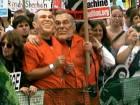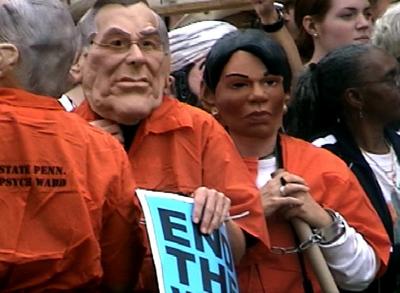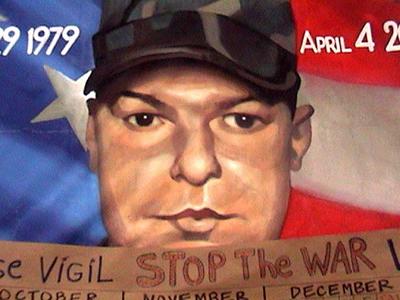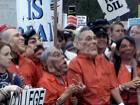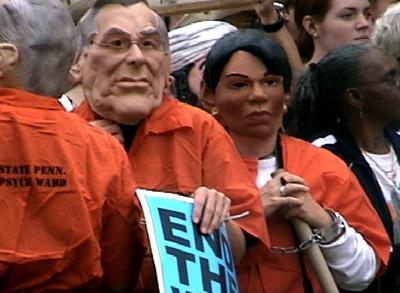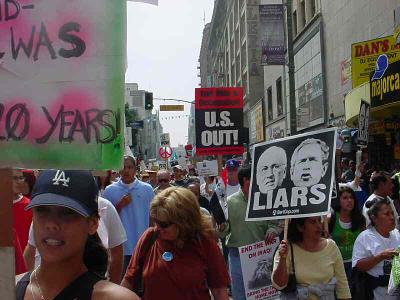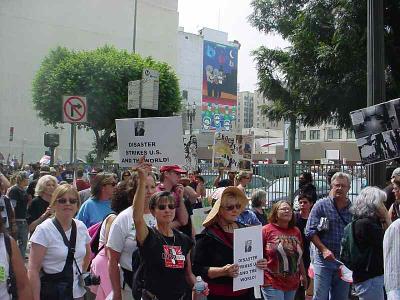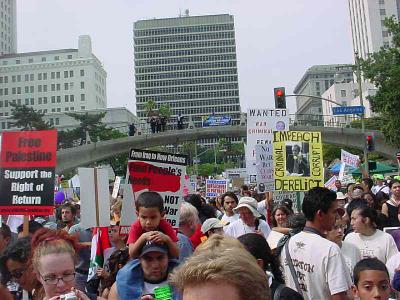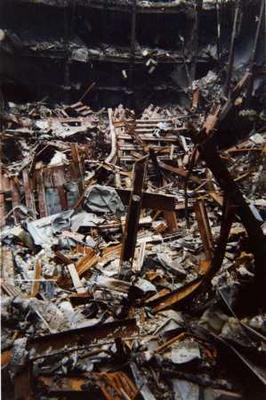
The mysterious cross that appeared in the rubbles of 9/11. It was actually a building beam welded together
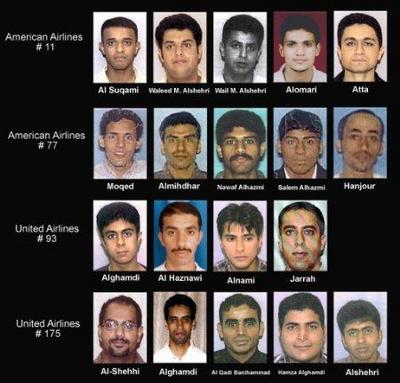
These are the 9/11 suicide hijackers identified by the US government. Some of them are alive, and the US has not been able to explain how it identified living people as dead.

Bush being told of the attack in New York on 9/11
This was written in one year ago. The subject is still fresh and hence I have opted to keep it on top
THERE is a sudden surge in contentions that the
official US government version of the Sept.11, 2001
attacks was the "biggest lie" ever told. The whole
scenario explanations provided by various
investigating agencies do not fit in with each other.
The Bush administration has been very secretive about
the affair, often giving contradictions and illogical
explanations.
From the very beginning there were suggestions that
Israel's Mossad secret agency was behind the attacks,
which led to a series of events that greatly benefited
Israeli interests. This included a big strain in
relations between the US and Arab and Muslim worlds —
whom Israel considers as its worst enemies. In
addition, and equally important, was the US invasion
of Iraq that resulted in eliminating the reign of
Saddam Hussein, who, among the Arabs, posed the
greatest challenge to Israel's expansionist ambitions
and its quest for regional domination. Today, the US
is going after Syria and Iran, the two other countries
which pose a challenge to Israel's objectives in the
Middle East.
The US is waging a self-styled war on terrorism, and
the obvious targets are Arabs and Muslims.
Let us also not forget that Israel did not have to
send a single soldier or fire a single bullet to
remove Saddam from power and render Iraq as a
crippled, devastated country which would take decades
to get on its own feet let alone rebuild its military
capabilities to a level that it had under the reign of
Saddam Hussein.
It might be shocking for some people to read the
theory that it was Mossad and not Al Qaeda which
pulled the strings from behind the scenes. Some might
even be indignant to hear suggestions that it was not
Osama Bin Laden but Mossad planners who plotted and at
least partially executed the Sept.11 attacks. To such
indignant people - some of whom even take pride that a
Muslim like Bin Laden managed to strike such a big
blow like the Sept.11 attacks against the world's sole
superpower, I say this: Bin Laden and his Al Qaeda
operatives could not have carried out the attacks
without meticulous planning months in advance with
help from people who had not only deep intelligence
connections in the US but also the opportunity and
ability to create the right conditions to stage the
attacks. Those people could not be Al Qaeda
operatives. They had to be people with high
connections within the American security and aviation
systems with deep knowledge of how the systems worked
and what are the best means to set up misleading
information and signs that pointed in the direction
that Arab Muslims were behind the attacks.
The most obvious names that come up is: Israel and
Mossad.
Intelligence information now clearly indicates that
Mossad knew in advance about the Sept.11 attacks in
the US because its agents, Jews pretending to be Arab
militants with an anti-American agenda, had penetrated
the ranks of Al Qaeda months before the attacks and
were closely involved in planning the assaults,
according to highly informed intelligence sources.
Mossad actually helped Al Qaeda carry out the attacks
by providing logistics and then stepped back to allow
the Arab hijackers go ahead with the plans for the
attacks.
American intelligence agencies sensed the Mossad
agent's contacts with the Sept.11 hijackers and this
prompted the Israeli spy network to inform the CIA and
other US agencies that attacks were being planned but
without giving any specific information. Today, the
passing on of the information that attacks were being
planned is cited as Mossad's "good faith" relations
with the CIA and the US.
However, intelligence sources say that Mossad had
deliberately misled the CIA in order to save itself
from the accusation that it was helping the hijackers.
For all technical purposes, Mossad told its American
counterparts that its agents were keeping an eye on Al
Qaeda agents and were in touch with them only to help
foil the group's plans, but in actually the Mossad
operatives co-operated closely with the hijackers and
helped them with hard information (gained through
Mossad intelligence operations) on the American
aviation security system and other logistic support.
Intelligence agencies now have definite and proven
information that two Mossad cells of six Egyptian and
Yemeni born Jews were given training at a secret base
in Israel's Naqeeb desert in early 2001, months before
the Sept.11 attacks, on how to penetrate Al Qaeda. All
of them spoke fluent Arabic and knew how to behave as
pious Muslims, offering regular prayers and were given
close training to act as devoted to the Arab and
Muslim causes. One of the cells went to Amsterdam
and worked under the control of Mossad's Europe
station, which based at Schipol airport within the El
Al (Israeli airline) complex there. They later made
contact in Hamburg with Mohammed Atta, the lead
hijacker on Sept.11, and offered their help to carry
out sabotage attacks against the US. At that point,
Atta is believed to have been planning the Sept.11
attacks and therefore he readily accepted the offer
from the Mossad team without any idea that they were
from the enemy camp.
Another Mossad cell went to New York and then to
Florida, where they contacted several of the would-be
hijackers based in information provided by Atta in
good faith to the Mossad group in Hamburg. In August
2001, a month before the attacks, the Mossad team in
Europe flew to Boston, the US, with some of the
would-be hijackers who were living in Hamburg.
Parallel to the secret operations with Atta in Europe
and the US, dozens of Mossad agents were also active
securing information on "loopholes" in the American
security system to help execute the Sept.11 attacks.
American intelligence agencies had grown suspicious of
some of the Mossad agents, some of whom pretended to
be art students, and this left Mossad with no choice
but to admit to the CIA that they were its agents who
were keeping an eye on Bin Laden's group and they had
come across information that the group was planning
attacks in the US.
Between mid-August 2001 and early September, the then
Mossad chief Efraim Halevy sent two "warnings" to the
CIA of the possibility of such attacks. The CIA noted
the warnings and acknowledged them, but the agency
found the warning as "too non-specific." The FBI was
also informed.
Mossad did not give any specifics about the expected
date of the attack or targets although it knew these
details in advance, according to the sources. Mossad
wanted not only to escape from American suspicions
raised by the Israeli agents' involvement with the
Atta group but also to ensure that the Sept.11 attacks
went ahead. That is why it deliberately withheld
detailed information about the date and target.
American intelligence agents were sceptical of the
Mossad version, but they had no concrete evidence of a
direct Mossad involvement in the attacks and hence the
silence so far in the intelligence circles across the
Atlantic.
Now, there are classified documents available with
European and American intelligence agents which offer
indicators that Mossad agents were not simply spying
on the Al Qaeda hijackers but were also actually
deeply involved in the planning and supporting the
execution of the plans with logistics.
However, Mossad places the blame squarely at the door
of American intelligence agencies saying the CIA did
not take the warnings of the attacks seriously. Mossad
also claims that it had such difficulty getting the
CIA to heed the warnings that it even used the Russian
intelligence agency and and the German BND
intellegence agency to repeat the warnings to the CIA,
but that the American agency failed to take proper
note.
Fox News correspondent Carl Cameron reported in
December 2001 after months of investigations that,
since Sept.11, "more than 60 Israelis have been
arrested or detained, either under the new patriot
anti-terrorism law, or for immigration violations. A
handful of active Israeli military personnel were
among those detained, according to investigators, who
say some of the detainees also failed polygraph
questions when asked about alleged surveillance
activities against and in the United States.
"There is no indication that the Israelis were
involved in the 9/11 attacks, but investigators
suspect that they Israelis may have gathered
intelligence about the attacks in advance, and not
shared it. A highly placed investigator said there are
'tie-ins.' But when asked for details, he flatly
refused to describe them, saying, 'evidence linking
these Israelis to 9/11 is classified. I cannot tell
you about evidence that has been gathered. It's
classified information.'
"Numerous classified documents obtained by Fox News
indicate that even prior to Sept.11, as many as 140
other Israelis had been detained or arrested in a
secretive and sprawling investigation into suspected
espionage by Israelis in the United States, " said
Cameron.
Interestingly, Cameron was immediately told to halt
his investigations. His reports which were put on the
Foxnews website were removed from the site.
How did Mossad gain inside information about Al
Qaeda's communications?
Again, the Mossad team played yet another deception.
Mossad had obtained a US-developed powerful
case-management software through dubious means and
provided it to Al Qaeda, which used it to spy on
American agencies which could have detected and
prevented the Sept.11, 2001 attacks.
At the same time, the software also allowed Mossad
itself to monitor Al Qaeda communications using
computers and also access Al Qaeda databases.
The software, called PROMIS and developed by Inslaw
Inc, an American company, was not
supposed to have been available to any non-US
government, agency, individual or commercial entity or
organisation, was passed on to Mossad by American
officials in the Pentagon recruited by the Israeli spy
agency.
Israeli experts, who are known to lead the global
scene in military and intelligence software, modified
the programme and passed it on to Al Qaeda through
Mossad agents posing as Palestinian supporters of Al
Qaeda.
While Al Qaeda could use that programme to hack into
the most defended and protected databases, Mossad also
planted another programme — described as a 'trap door'
— in Al Qaeda computers that allowed the Israelis to
monitor Osama Bin Laden's follower's activities in
cyberspace. Simply put, Mossad agents could access and
monitor the computers using the Israeli-modified
version of PROMIS and thus keep themselves abreast of
Al Qaeda operatives' communications and database.
It is like having a powerful long-range microphone
planted right under the nose of your
adversary.
There is no way Mossad would not have known how Al
Qaeda operatives used the software in facilitating
preparations for the Sept.11 attacks since Mossad
itself was using the trap door in the software to
monitor Al Qaeda computers.
The FBI discovered the indirect Mossad-Qaeda link
while investigating an Israeli spy, Lawrence Franklin,
a top Pentagon analyst on Iran, who passed on
sensitive and top-secret documents about US plans for
regime change in Tehran.
It has been proved that nearly 130 Israeli
intelligence agents were arrested in the days
immediately after Sept.11. All of them were allowed to
leave the US after a few months after questioning,
but the world never knew what they had "confessed" to
their Federal Bureau of Investigation (FBI) or Central
Intelligence Agency (CIA) questioners.
Here comes the clinch: Five of the Israelis were
arrested when they were seen filming the attacks from
a point which offered the best view of the World Trade
Centre towers which were hit. They were seen
congratulating each other and dancing and this aroused
the suspicion of a woman who notified New York police
because they looked Middle Eastern and possibly Arabs.
Witnesses saw them jumping for joy in Liberty State
Park after the initial impact. Later on, other
witnesses saw them celebrating on a roof in and still
more witnesses later saw them celebrating with
shaking hands and congratulating each other in a
Jersey City parking area.
"It looked like they're hooked in with this. It
looked like they knew what was going to happen when
they were at Liberty State Park," said a witness.
One anonymous phone call to the authorities actually
led police to close down all of New York's bridges and
tunnels. The mystery caller told police a group of
Palestinians were mixing a bomb inside of a white van
headed for the Holland Tunnel.
Police then issued a “Be-on-the-Lookout” alert for a
white mini-van heading for the city's bridges and
tunnels from New Jersey. When a van fitting that
exact description was stopped just before crossing
into New York, the suspicious “Middle-Easterners”
were apprehended. And they turned out be Israelis.
However, the van was nowhere near Holland Tunnel as
the mystery call told police.
It appeared that the caller wanted police to focus on
Holland Tunnel while the actual van was somewhere
else. In the van, police found maps of the city with
certain places highlighted, box cutters (the same
items that the hijackers supposedly used), $4,700
cash stuffed in a sock, and foreign passports. Bomb
sniffing dogs were brought to the van and that they
reacted as if they had smelled explosives.
The FBI seized and developed their photos, one of
which shows one of the four flicking a cigarette
lighter in front of the smouldering ruins in an
apparently celebratory gesture.
The FBI found that the Israelis worked for a moving
company known as Urban Moving Systems. An American
employee of Urban Moving Systems said a majority of
his co-workers were Israelis and they were all joking
about the attacks. Urban Moving System's Israeli
owner, Dominick Suter, was questioned and released
with instructions that he should report to police
whenever asked to do so. But a few days later, he
abandoned his business and fled the US for Israel.
Obviously, he was in such a hurry to leave the US that
s ome of Urban Moving System's customers were left
with their furniture stranded in storage facilities.
The FBI was established that the five detained
Israelis were in fact Mossad agents. The agency
released them after 71 days in custody. No detail of
their statement was ever released to the media.
In the meantime, American mainstream media was told,
implictly or explictly, to focus on Bin Laden and soon
thousands reports started appearing suggesting that
the Yemeni origin Saudi was behind the attacks.
The propaganda machinery told readers, listeners and
viewers that Muslims were “medieval” and wanted to
destroy the because they envied American wealth and
way of life.
Bin Laden strongly denied any role in the attacks.
"I was not involved in the September 11 attacks in
the United States nor did I have knowledge of the
attacks," he said in a statement. "There exists a
government within a government within the United
States. The United States should try to trace the
perpetrators of these attacks within itself; to the
people who want to make the present century a century
of conflict between Islam and Christianity. That
secret government must be asked as to who carried out
the attacks. The American system is totally in
control of the Jews, whose first priority is Israel,
not the United States."
There is no evidence, be it hard or circumstantial,
to link the Al Qaeda was involved in the attacks. On
the other hand, there is enough evidence suggesting
Israelis were very busy framing Arabs for terror
plots against America.
Remote control?
Then there is the "mystery" of frozen/jammed
communications between the hijacked 9/11 airplaes and
ground control and the accuracy with which they hit
the two World Trade Centre towers as if by remote
control.
An interesting revelation is that a US-based company,
System Planning Corporation (SPC) designs,
manufactures and distributes highly sophisticated
technology that enables an operator to fly by remote
control as many as eight different airborne vehicles
at the same time from one position either on the
ground or airborne (www.sysplan.com/Radar/CTS).
More importantly, SPC, which is headquartered in
Arlington, Virginia, has the technology to take over
the controls of an airborne plane already in flight
and could "hijack hijackers" and bring the plane down
safely.
The catch here is: Dov Zakheim, an American Jewish
rabbi, served as the head of SPC's international
division until Bush appointed him under-secretary of
defence and comptroller of the Pentagon (Zakheim
resigned from the Pentagon job in March last year
saying that his duties were exhausting).
Zakheim co-authored an article, "Rebuilding America's
Defences: Strategy, Forces and Resources for a New
Century," published by The Project for a New American
Century in September 2000.
A segment in the books says that "the process of
transformation, even if it brings revolutionary
change, is likely to be a long one, absent some
catastrophic and catalysing — like a new Pearl
Harbour."
Implicit in Rabbi Dov Zakheim's argument is the theory
that a false flag intelligence operation would
trigger a response by the USA that would be good for
Israe.
The means consisted of the aforementioned remote
control of airborne vehicle technologies as well as
the nurturing, creative accounting at the Pentagon to
pay for such an operation.
The opportunity was Zakheim's closeness to the
Command/Control/Communications in Washington and its
Zionist neo-conservatives determined to provoke a war
with Saddam Hussein.
Aassinations and leaving red herrings that point at
Arabs as culprits. These actions started even before
Israel was created in 1948. An outstanding example is
a series of bombings at Jewish businesses and
community centres as well as at least one synagogue in
Iraq in the 40s and 50s that were blamed on Arabs
seeking to kill Jews and the government running a
pogom against Jews. The bombings terrified thousands
of the Iraqi Jews into migrating to Israel; that was
the very objective of the Israeli agents who carried
out the blasts. This has been admitted by several
prominent Iraqi Jews who migrated to Israel made
themselves successful politicians in the Jewish state.
It is also documents in the book, Ben Gurion's
Scandals: How the Haganah & the Mossad Eliminated
Jews, written by Naem Giladi, an Iraqi Jew. The book
says one of the Israeli aims behind the action was to
import raw Jewish labour to work in newly-vacated
farmlands and to fill in the military ranks.
"About 125,000 Jews left Iraq for Israel in the late
1940s and into 1952, most because they had been lied
to and put into a panic by what I came to learn were
Zionist bombs," Giladi said in an interview in 1998.
He said he had documents, "including some that I
illegally copied from the archives at Yad Vashem (war
memorial in occupied Jerusalem)," which "confirm what
I saw myself, what I was told by other witnesses, and
what reputable historians and others have written
concerning the Zionist bombings in Iraq, Arab peace
overtures that were rebuffed, and incidents of
violence and death inflicted by Jews on Jews in the
cause of creating Israel."
Wilbur Crane Eveland, a former senior officer in the
Central Intelligence Agency (CIA), writes in his book,
Ropes of Sand:
"In attempts to portray the Iraqis as anti-American
and to terrorise the Jews, the Zionists planted bombs
in the US Information Service library and in
synagogues. Soon leaflets began to appear urging Jews
to flee to Israel. . . .
"Although the Iraqi police later provided (the US)
embassy with evidence to show that the synagogue and
library bombings, as well as the anti-Jewish and
anti-American leaflet campaigns, had been the work of
an underground Zionist organisation, most of the world
believed reports that Arab terrorism had motivated the
flight of the Iraqi Jews whom the Zionists had
'rescued' really just in order to increase Israel's
Jewish population."
In the early 1950s, a book was published in Iraq, in
Arabic, titled Venom of the Zionist Viper, written by
one of the Iraqi investigators of the 1950-51
bombings. The author implicates the Israelis,
specifically one of the emissaries sent by Israel,
Mordechai Ben-Porat. As soon as the book came out, all
copies just disappeared, even from libraries. The word
was that agents of the Israeli Mossad, working through
the US embassy, bought up all the books and destroyed
them.
Other examples of such Israeli deceptive operations
are:
In 1954, Israeli agents working in Egypt planted bombs
in several buildings, mostly targeting American and
British interests, in Cairo and Alexandria. They
planted evidence implicating Arabs as the culprits
with a view to alienating the US and UK from Egypt.
However, the plot blew up on Israel's face when one
of the bombs exploded prematurely and allowed.
Egyptian police to capture one bombers who in turn led
them to the Israeli spy ring.
Some of them were Israeli nationals and others were
Egyptian Jews.
They were put on trial and sentenced to prison terms
of upto 15 years.
Veteran British journalist David Hirst wrote in his
book The Gun and the Olive Branch:
"The trial established that the bombings had indeed
been carried out by an Israeli espionage and terrorist
network. This was headed by Colonel Avraharn Dar
--alias John Darling-- and a core of professionals who
had set themselves up in Egypt under various guises.
They had recruited a number of Egyptian Jews; one of
them was a young woman, Marcelle Ninio, who worked in
the offices of a British company.
"Naturally, the eventual exposure of such an
organizsation was not going to improve the lot of the
vast majority of Egyptian Jews who wanted no-thing to
do with Zionism. There were still at least 50,000 Jews
in Egypt; there had been something over 60,000 in
1947, more than half of whom were actually foreign
nationals. During the first Arab-Israeli war of 1948,
the populace had some times vented its frustration
against them, and some were killed in mob violence or
by terrorist bombs. In spite of this, and of the
revolutionary upheaval which followed four years
later, few Jews-including the foreign nationals-left
the country, and fewer still went to Israel. A Jewish
journalist insisted: 'We, Egyptian Jews, feel secure
in our homeland, Egypt'."
Despite irrefutable evidence that it was behind
"Operation Susannah" — which later came to be known as
the Lavon affair — Israel maintained that the whole
episode was stage-managed by "anti-Semites."
As the trial progressed in Egypt, Israel opted to turn
its then defence minister Pinhas Lavon as the
scapegoat. Lavon was brought down by the scandal and
the real intelligence operatives behind the plot were
never brought to light.
In 1967, Israel warplanes attacked the American spy
ship USS Liberty and killed 35 American sailors and
crippled the vessels in what it said was a mistake
despite all indications that it knew it was an
American ship. Captain Ward Boston, who served as
adviser for the Navy's Court of Inquiry into the
attack, has revealed that the Court of Inquiry was
ordered by the then president Lyndon Johnson to
conclude that the attack was an accident,
Military experts have found that Israel had used
unmarked aircraft and boats in the actual attack,
indicating that Israel intended to sink the US ship
and frame Egypt for the attack, tricking the US into
the war against Egypt.
In 1986, Mossad tricked the then president, Ronald
Reagan, into bombing Libya by means of a radio
transmitter planted in the Libyan capital, Tripoli.
The secret broadcasting device, known was Trojan,
sent out Israeli-engineered false messages to American
and British listening stations, according to a former
Mossad agent.
The misinformation transmitted through the device
led to framing Libyan leader Muammar Qadhafi in the
April 1986 bombing of a disco in Berlin frequented by
American servicemen. A court in Germany tried the case
and ruled that Libya was behind the bombing in which
two Americans were killed and nearly 80 people were
injured..
Prominent among the evidence produced in court against
Libya were "secret communications in Arabic" picked up
American intelligence and which were said to be
"instructions" to Libyan agents to carry out the
bombing.
This revelation has come from Vctor Ostrovsky, 60, a
Canadian-born Jew who emigrated to Israel in 1950, who
says he became an agent of the Mossad in 1984 but quit
the agency in 1998 in "disgust." According to
Ostrovsky, he was among a Mossad team which sneaked
into Tripoli, Libya, on the night of Feb. 17, 1986,
from the Mediterranean in mini-submarines and planted
the "trojan" in an apartment rented by a Mossad agent
there.
The planted "trojan" was used by Mossad to transmit
messages in Arabic that were then rebroadcast from
Tripoli, to make it look as if Qadhati had been
communicating with his agents about upcoming militant
attacks, among them the 1986 Berlin bombing.
How does this Israeli record fit into the 9/11
scenario.
Until now, it has not been established who was on the
four hijacked planes. The Federal Bureau of
Investigation (FBI) admits that the only hard
evidence are the names used by the hijackers on
forged identification documents. At least seven of
the men whose names were on those IDs have been found
to be alive. One of them died bin 1999. None of the
names of the alleged hijackers were on the passenger
lists of the four hijacked planes. Yet, the net (false
or true) impression is that all of them were Arab
Muslims.
Some of these men behaved strangely on the night
before 9/11/2001. They visited bars and strip
night-clubs and behaved as if they wanted to be
noticed and remembered by all they met.
This behaviour in itself is unseemingly of any devout
Muslim willing to commit suicide would spend the night
before his death violating the tenets of their faith.
Intelligence experts believe that a false trail was
being ahead of the hijackings.
It has now been established that only two Israelis —
both aboard the hijacked planes — were killed in the
9/11 attacks although reports claim that upto 130
Israelis were killed.
Some reports suggest that Israelis were given an
advance warning not to go to work at the World Trade
Center towers on 9-11. I don't think the reports are that credible.
Two employees of Odigo, an Israeli company with
offices located near the World Trade Centre towers,
received warning messages sent before the four planes
had even left the ground, thus establishing that that
someone in Israel knew of the attacks ahead of time.
